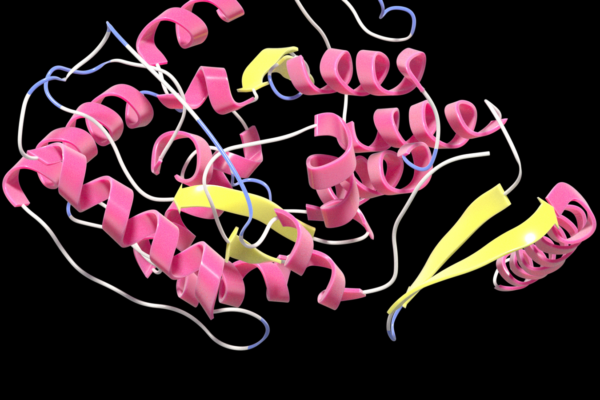
Engineering techniques are already used to design novel proteins with the potential to become new therapies. Nvidia and partner Evozyne have new research showing that their technologies created novel proteins never before seen in nature, doing it faster and with better results. They did it by studying the language of life.
Language learning models are now a hot discussion topic due to technologies such as ChatGPT, AI software that analyzes language to answer questions and even engage in conversation with a user. Kimberly Powell, vice president of health care at Nvidia, says language learning techniques can also be applied to genomics, in particular proteins that are encoded by our genes.
“We’ve learned that these large language models can understand relationships just through studying amino acid sequence,” Powell said. “There is information about protein function when you can encode and represent and explore that data in these large language models.”
The research results were announced during the recent J.P. Morgan Healthcare Conference in San Francisco. Powell discussed them during a separate briefing with journalists. The novel proteins stem from a collaboration between Nvidia and Evozyne, a Chicago-based protein design startup. Neither company develops new drugs but their technologies are used by biotech and pharmaceutical companies working in drug discovery.
Nvidia and Evozyne began working together in 2022, collaborating to develop a new deep learning model that can learn the rules of protein function. Using those rules, they aimed to design new proteins with improved functions. The model was built on Nvidia’s technology for training and deploying large language models for biology.
The Nvidia and Evozyne research focused on the phenylalanine hydroxylase (PAH) protein family. PAH is an enzyme needed to break down phenylalanine, an amino acid found in certain foods. PAH deficiency leads to a rare disorder called phenylketonuria (PKU), in which phenylalanine levels build up in the body and cause neurological impairment. Patients who have this inherited disorder manage it by maintaining a strict diet that avoids phenylalanine-containing food.

Integrating GLP-1s: How Berry Street is Redefining Nutrition Care
Richard Fu details the company's approach to nutrition therapy and strategy for patients using GLP-1s.
When engineering therapeutic proteins, scientists aim to make changes that enhance the protein’s function without compromising its safety. In the research described by Nvidia, Evozyne was able to create a PAH protein with 51 mutations. Despite all of those changes, that protein was still able to achieve a two-and-a-half times enhancement in functionality compared to native human PAH, Powell said. Going further, the technology was able to design a PAH protein with 167 mutations. Despite changing more than half of the protein, that version of PAH still retained its function.
PKU has few FDA-approved therapies. BioMarin Pharmaceutical markets two: the small molecule drug Kuvan, and Palynziq, an engineered enzyme designed to substitute for the deficient PAH. But the use of these drugs does not eliminate the need for patients to continue dietary restrictions. BioMarin is also developing a gene therapy that offers the potential for a one-time treatment of the enzyme deficiency.
Other companies are in various stages of development with potential PKU therapies that could help the patients who don’t respond to the currently available BioMarin products. Homology Medicines is in early-stage clinical testing of a gene-editing therapy that replaces the disease-causing gene with a functional one. PTC Therapeutics has reached late-stage clinical testing with a small molecule drug for PKU. Earlier this month, Jnana Therapeutics received FDA permission to begin a Phase 1 trial of a small molecule drug candidate for the metabolic disorder.
Powell said the results from Nvidia and Evozyne are promising for the design of novel protein therapies. Protein engineering methods used today include directed evolution, an approach that makes iterative changes until achieving the protein with the desired features and functions. She said directed evolution would have taken months, perhaps even years to achieve what Evozyne did to design its novel PAH proteins. The startup is calling its approach machine learning-guided protein engineering.
“With this ability for us to explore an essentially infinite space of proteins, to now be able to find the proteins with the function you desire while maintaining other properties that you also desire, like the safety of the proteins, that’s what these methods are absolutely unlocking,” Powell said.
Image by Nvidia








